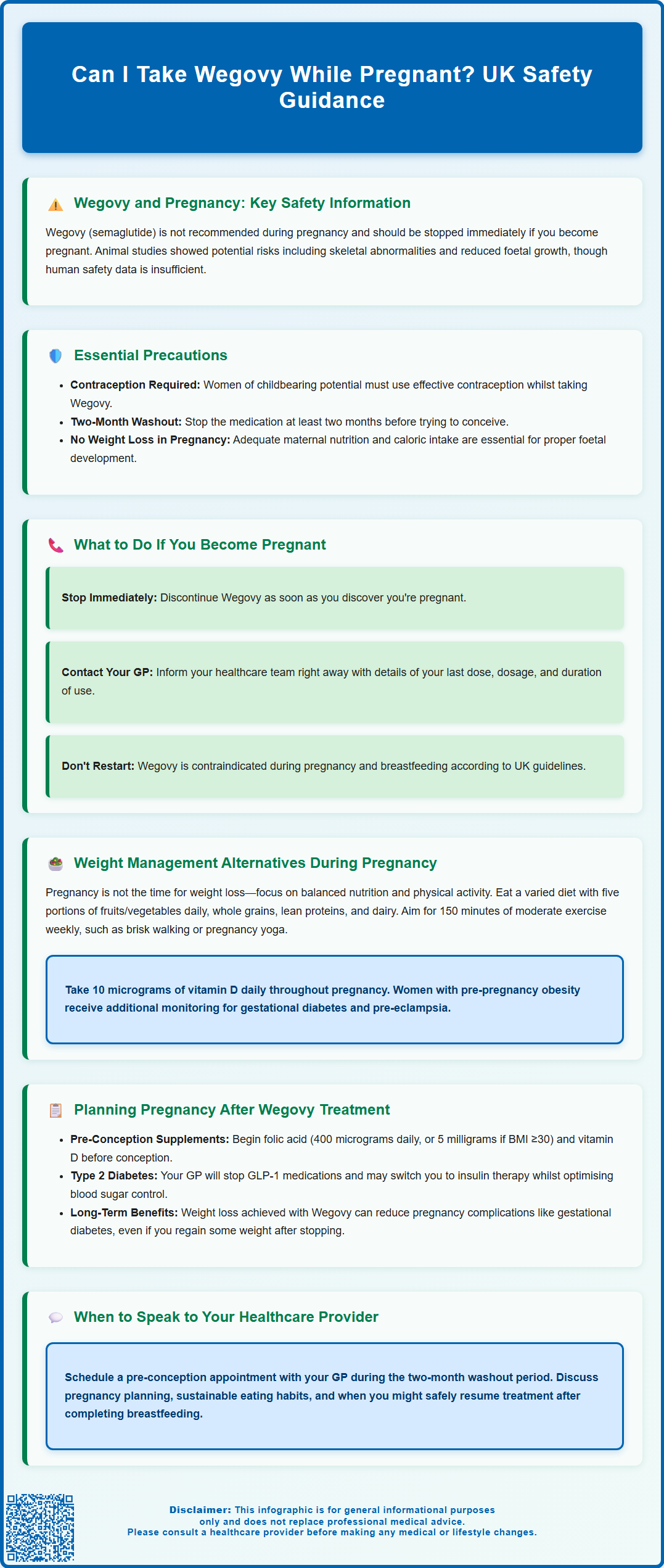Wegovy (semaglutide) is a GLP-1 receptor agonist licensed for weight management in adults with obesity or overweight with weight-related comorbidities. If you are pregnant or planning pregnancy, it is essential to understand that Wegovy is not recommended during pregnancy and should be stopped if you discover you are expecting. UK regulatory guidance from the MHRA and the Wegovy Summary of Product Characteristics advises against use in pregnancy due to limited human safety data and the principle that intentional weight loss is inappropriate during pregnancy. This article explains the safety considerations, what to do if you become pregnant whilst taking Wegovy, and how to plan pregnancy after treatment.
Summary: No, Wegovy (semaglutide) should not be taken during pregnancy and must be stopped immediately if you discover you are pregnant.
- Wegovy is a GLP-1 receptor agonist licensed for weight management, not recommended in pregnancy due to insufficient human safety data.
- UK guidance advises discontinuing Wegovy at least two months before attempting conception to allow medication clearance.
- Women of childbearing potential should use effective contraception during Wegovy treatment.
- If pregnancy occurs whilst taking Wegovy, stop the medication immediately and contact your GP or prescribing clinician promptly.
- Intentional weight loss during pregnancy is not advised as adequate maternal nutrition is essential for foetal development.
- Wegovy should not be used during breastfeeding according to the UK Summary of Product Characteristics.
Table of Contents
Wegovy and Pregnancy: Key Safety Information
Wegovy (semaglutide) is not recommended during pregnancy and should be discontinued if you discover you are pregnant. The UK Wegovy Summary of Product Characteristics (SmPC) and the Medicines and Healthcare products Regulatory Agency (MHRA) advise against using this medication whilst pregnant due to insufficient safety data in human pregnancies. Wegovy is a glucagon-like peptide-1 (GLP-1) receptor agonist licensed for weight management in adults with obesity or overweight with weight-related comorbidities.
Animal studies have shown potential risks to the developing foetus, including skeletal abnormalities and reduced foetal growth, though human data are very limited and it's unclear whether these animal findings apply to humans. The critical concern is that weight loss during pregnancy is generally not advised, as adequate maternal nutrition is essential for foetal development. Pregnancy requires additional caloric intake to support the growing baby, and intentional weight reduction could compromise foetal growth and development.
The UK SmPC for Wegovy clearly states that women of childbearing potential should use effective contraception during treatment. If you are planning to become pregnant, you should discontinue Wegovy at least two months before attempting conception. This washout period allows the medication to clear from your system, as semaglutide has a half-life of approximately one week. NICE guidance (PH27) and NHS resources emphasise that pregnancy planning should involve a comprehensive discussion with your GP or specialist about stopping weight-loss medications and transitioning to pregnancy-appropriate care. Your healthcare team can provide personalised advice based on your individual circumstances and medical history.
What to Do If You Become Pregnant While Taking Wegovy
If you discover you are pregnant whilst taking Wegovy, stop the medication immediately and contact your GP or prescribing clinician as soon as possible. Do not wait for your next scheduled appointment. You should also book your routine antenatal care with a midwife. Your healthcare provider needs to assess your situation promptly.
Be prepared to provide information about:
-
When you last took Wegovy
-
The dose you were taking
-
How long you had been on the medication
-
The approximate date of conception
-
Any other medications or supplements you are taking
Your midwife will arrange routine antenatal care, and additional monitoring may be considered. Human pregnancy data for semaglutide are very limited; inadvertent early exposure is not usually, on its own, a reason to end a pregnancy. Your healthcare team will provide individualised monitoring based on current guidance and your circumstances. For specific information about medication exposure in pregnancy, the UK Teratology Information Service (UKTIS) provides resources through their BUMPS website (Best Use of Medicines in Pregnancy).
It is essential to maintain open communication with your maternity care team throughout your pregnancy. They can address any concerns and ensure you receive appropriate nutritional guidance. Do not restart Wegovy during pregnancy or whilst breastfeeding, as the UK SmPC clearly states it should not be used during lactation. Pregnancy-related weight gain is normal and necessary for healthy foetal development. Your focus should shift entirely to maintaining a balanced, nutritious diet that supports both your health and your baby's growth. After delivery, you can discuss resuming weight management treatment with your healthcare provider once you have completed breastfeeding, if appropriate.
Any suspected side effects from previous Wegovy use can be reported through the MHRA Yellow Card scheme (yellowcard.mhra.gov.uk or the Yellow Card app).

Weight Management Alternatives During Pregnancy
Pregnancy is not the time for active weight loss, but maintaining a healthy lifestyle remains important. NICE guidance (PH27) emphasises that pregnant women should focus on balanced nutrition and appropriate physical activity rather than calorie restriction or weight-loss interventions. The recommended approach centres on eating a varied, nutritious diet that provides adequate energy and essential nutrients for foetal development.
Healthy eating during pregnancy includes:
-
Five portions of fruit and vegetables daily to provide vitamins, minerals, and fibre
-
Starchy carbohydrates such as wholemeal bread, pasta, rice, and potatoes for sustained energy
-
Protein sources including lean meat, fish, eggs, beans, and pulses
-
Dairy products or fortified alternatives for calcium
-
Limiting foods high in fat and sugar whilst ensuring adequate caloric intake
-
Taking vitamin D supplements (10 micrograms/400 IU daily) throughout pregnancy as recommended by the NHS
Physical activity during pregnancy is generally safe and beneficial for most women. The UK Chief Medical Officers recommend at least 150 minutes of moderate-intensity activity weekly throughout pregnancy, unless contraindicated. This should include muscle-strengthening activities and pelvic floor exercises. Suitable activities include brisk walking, swimming, pregnancy yoga, and antenatal exercise classes. Always consult your midwife or GP before starting new exercise routines, particularly if you have pregnancy complications or pre-existing medical conditions.
If you had obesity before pregnancy, your antenatal team may provide additional monitoring for conditions such as gestational diabetes, pre-eclampsia, and foetal growth. Your midwife can refer you to specialist services including dietitians who provide pregnancy-specific nutritional advice. Some areas offer specialist antenatal clinics for women with higher BMI, providing enhanced monitoring and support. The focus remains on optimising maternal and foetal health rather than weight reduction. After delivery, you can explore appropriate weight management strategies, including discussing whether resuming Wegovy is suitable for your circumstances.
Planning Pregnancy After Wegovy Treatment
If you are considering pregnancy whilst taking Wegovy, advance planning is essential. The UK SmPC recommends discontinuing Wegovy at least two months before attempting to conceive. This washout period ensures the medication has cleared your system before conception occurs. Schedule a pre-conception appointment with your GP to discuss stopping Wegovy and optimising your health for pregnancy.
Your pre-conception consultation should address:
-
Timing of Wegovy discontinuation and contraception until the washout period completes
-
Folic acid supplementation (400 micrograms daily, or 5 milligrams if you have a BMI ≥30, diabetes, or other high-risk factors) as per NHS and RCOG guidance
-
Vitamin D supplementation (10 micrograms/400 IU daily) as recommended by the NHS
-
Review of other medications to ensure they are pregnancy-safe
-
Screening for conditions such as diabetes, thyroid disorders, and hypertension
-
Lifestyle modifications including smoking cessation and alcohol avoidance
-
Optimising management of pre-existing conditions
If you have type 2 diabetes and are taking GLP-1 receptor agonists like Wegovy, NICE guidance (NG3) recommends stopping these medications before conception. Your GP may consider continuing metformin and will discuss switching to insulin therapy if needed, along with optimising your HbA1c levels and reviewing any potentially teratogenic medicines (such as ACE inhibitors, ARBs, or statins).
Weight achieved through Wegovy treatment may reduce the risk of pregnancy complications, even if some weight regain occurs after stopping the medication. Research suggests that even modest weight loss before pregnancy may reduce risks of gestational diabetes, pre-eclampsia, and other complications in women with obesity. Your GP can provide personalised advice about maintaining weight stability during the washout period through diet and physical activity.
Some women worry about weight regain after stopping Wegovy. Focus on establishing sustainable healthy habits that you can maintain through pregnancy and beyond. Working with a dietitian before conception can help you develop an eating pattern that supports weight maintenance whilst preparing your body for pregnancy's nutritional demands. Remember that some weight regain is common after stopping weight-loss medications, but the overall health improvements from previous weight loss often persist. Your healthcare team can support you in balancing pregnancy planning with long-term weight management goals, ensuring the best possible outcomes for both you and your future baby.
Frequently Asked Questions
How long before trying to conceive should I stop Wegovy?
You should discontinue Wegovy at least two months before attempting conception. This washout period allows the medication to clear from your system, as semaglutide has a half-life of approximately one week, and ensures no medication exposure during early pregnancy.
What should I do if I accidentally took Wegovy in early pregnancy?
Stop taking Wegovy immediately and contact your GP or prescribing clinician as soon as possible. Human pregnancy data are very limited, but inadvertent early exposure is not usually, on its own, a reason to end a pregnancy; your healthcare team will provide individualised monitoring and advice.
Can I use Wegovy whilst breastfeeding?
No, the UK Summary of Product Characteristics clearly states that Wegovy should not be used during breastfeeding. You can discuss resuming weight management treatment with your healthcare provider once you have completed breastfeeding, if appropriate.
The health-related content published on this site is based on credible scientific sources and is periodically reviewed to ensure accuracy and relevance. Although we aim to reflect the most current medical knowledge, the material is meant for general education and awareness only.
The information on this site is not a substitute for professional medical advice. For any health concerns, please speak with a qualified medical professional. By using this information, you acknowledge responsibility for any decisions made and understand we are not liable for any consequences that may result.
Heading 1
Heading 2
Heading 3
Heading 4
Heading 5
Heading 6
Lorem ipsum dolor sit amet, consectetur adipiscing elit, sed do eiusmod tempor incididunt ut labore et dolore magna aliqua. Ut enim ad minim veniam, quis nostrud exercitation ullamco laboris nisi ut aliquip ex ea commodo consequat. Duis aute irure dolor in reprehenderit in voluptate velit esse cillum dolore eu fugiat nulla pariatur.
Block quote
Ordered list
- Item 1
- Item 2
- Item 3
Unordered list
- Item A
- Item B
- Item C
Bold text
Emphasis
Superscript
Subscript










